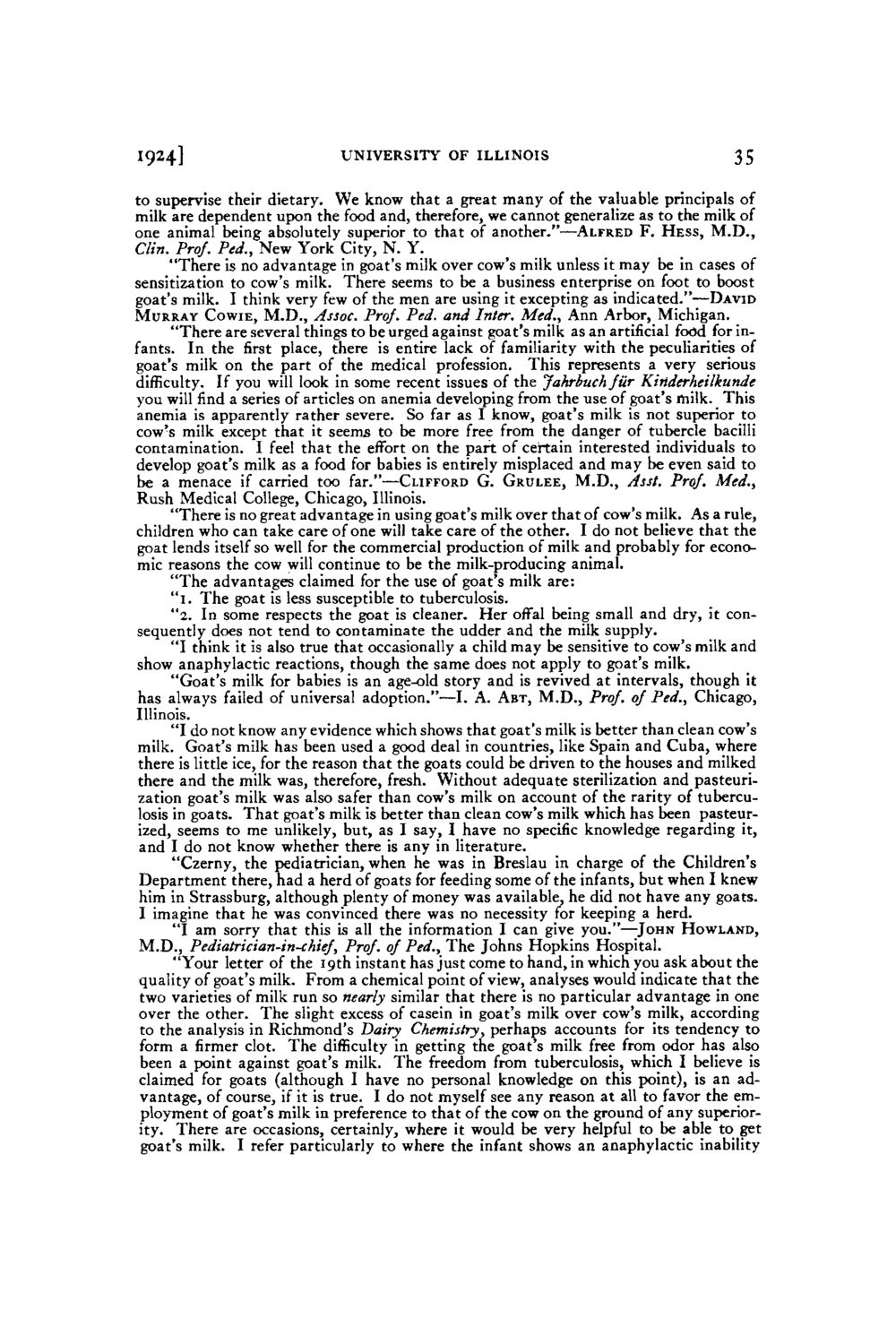| |
| |
Caption: Board of Trustees Minutes - 1926
This is a reduced-resolution page image for fast online browsing.

EXTRACTED TEXT FROM PAGE:
1924] U N I V E R S I T Y O F ILLINOIS 35 to supervise their dietary. W e know that a great m a n y of the valuable principals of milk are dependent upon the food and, therefore, we cannot generalize as to the milk of one animal being absolutely superior to that of another."—Alfred F. Hess, M.D., Clin. Prof. Ped., N e w York City, N . Y. "There is no advantage in goat's milk over cow's milk unless it m a y be in cases of sensitization to cow's milk. There seems to be a business enterprise on foot to boost goat's milk. I think very few of the m e n are using it excepting as indicated."—David M u r r a y Cowie, M.D., Assoc. Prof. Ptd. and Inter. Med., A n n Arbor, Michigan. "There are several things to be urged against goat's milk as an artificial food for infants. In the first place, there is entire lack of familiarity with the peculiarities of goat's milk on the part of the medical profession. This represents a very serious difficulty. If you will look in some recent issues of the Jahrbuch fur Kinderheilkunde you willfinda series of articles on anemia developing from the use of goat's milk. This anemia is apparently rather severe. So far as I know, goat's milk is not superior to cow's milk except that it seems to be more free from the danger of tubercle bacilli contamination. I feel that the effort on the part of certain interested individuals to develop goat's milk as a food for babies is entirely misplaced and m a y be even said to be a menace if carried too far."—Clifford G. Grulee, M.D., Asst. Prof. Med., Rush Medical College, Chicago, Illinois. "There is no great advantage in using goat's milk over that of cow's milk. As a rule, children w h o can take care of one will take care of the other. I do not believe that the goat lends itself so well for the commercial production of milk and probably for economic reasons the cow will continue to be the milk-producing animal. "The advantages claimed for the use of goat's milk are: "1. The goat is less susceptible to tuberculosis. "2. In some respects the goat is cleaner. Her offal being small and dry, it consequently does not tend to contaminate the udder and the milk supply. "I think it is also true that occasionally a child m a y be sensitive to cow's milk and show anaphylactic reactions, though the same does not apply to goat's milk. "Goat's milk for babies is an age-old story and is revived at intervals, though it has always failed of universal adoption."—I. A. Abt, M.D., Prof, of Ped., Chicago, Illinois. "I do not know any evidence which shows that goat's milk is better than clean cow's milk. Goat's milk has been used a good deal in countries, like Spain and Cuba, where there is little ice, for the reason that the goats could be driven to the houses and milked there and the milk was, therefore, fresh. Without adequate sterilization and pasteurization goat's milk was also safer than cow's milk on account of the rarity of tuberculosis in goats. That goat's milk is better than clean cow's milk which has been pasteurized, seems to m e unlikely, but, as I say, I have no specific knowledge regarding it, and I do not know whether there is any in literature. "Czerny, the pediatrician, when he was in Breslau in charge of the Children's Department there, had a herd of goats for feeding some of the infants, but when I knew him in Strassburg, although plenty of money was available, he did not have any goats. I imagine that he was convinced there was no necessity for keeping a herd. "I a m sorry that this is all the information I can give you."—John H o w l a n d , M.D., Pediatrician-in-chief, Prof, of Ped., The Johns Hopkins Hospital. "Your letter of the 19th instant has just come to hand, in which you ask about the quality of goat's milk. From a chemical point of view, analyses would indicate that the two varieties of milk run so nearly similar that there is no particular advantage in one over the other. The slight excess of casein in goat's milk over cow's milk, according to the analysis in Richmond's Dairy Chemistry, perhaps accounts for its tendency to form a firmer clot. The difficulty in getting the goat's milk free from odor has also been a point against goat's milk. The freedom from tuberculosis, which I believe is claimed for goats (although I have no personal knowledge on this point), is an advantage, of course, if it is true. I do not myself see any reason at all to favor the emity. There are refer particularly to where thewouldcow on the groundto be able to get goat's milk. I occasions, preference to that the shows helpful of any inability ployment of goat's milk in certainly, where itofinfantbe very an anaphylactic superior-
| |